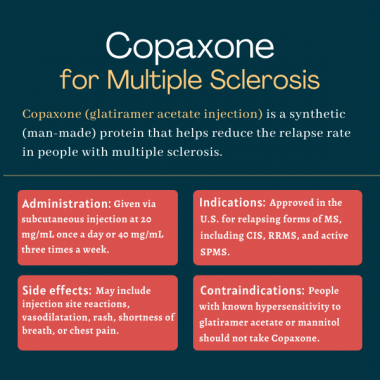FAQs about Copaxone
Copaxone’s approval in December 1996 was for the treatment of adults with relapsing-remitting MS, followed by a change to the current indication of relapsing forms of the disease — which include clinically isolated syndrome, relapsing-remitting MS, and active secondary progressive MS. A higher and less frequently administered formulation (40 mg/mL) of Copaxone was approved in January 2014.
According to animal data, treatment with Copaxone results in no adverse effects on the fetus or offspring development; however, there are no well-controlled studies in pregnant women. Copaxone’s U.S. label indicates that patients should inform their healthcare team if they are pregnant or have plans to become pregnant.
No known interactions exist between Copaxone and alcohol consumption. However, given that alcohol can interfere with some medications and disease symptoms, patients should discuss this topic with their healthcare provider.
According to Teva Pharmaceuticals, which markets Copaxone, patients taking the therapy usually see results at one year.
During clinical trials, hair loss and weight gain were not reported as side effects associated with Copaxone use. There are, however, some isolated reports of unusual weight gain in some cases and weight loss in others. Patients are advised to talk with their healthcare team if they experience any such issues.
Related Articles

 Fact-checked by
Fact-checked by 






